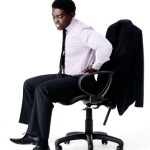Bottoms Up! A Better Way to Sit.

At my first place of employment, the physical therapists in our outpatient facility began an informal, yet persistent, campaign to get every employee to sit with proper low back posture. Full disclosure—this initiative began because we therapists were growing weary of treating our support staffs’ chronic back and neck pain issues during our break time!
So, what exactly is“proper low back posture” you ask?Excellent question. For most persons, a gentle lordosis, or backward facing C-curve, is best for protecting against disc bulging and ligament over-stretching.*
The way we attempted to achieve this health-promoting posture among our office staff was by strapping a cushioned roll on the back of each person’s chair. We then instructed them to sit their bottom at the very back of their seats and then allow their lower back to arch over the roll. The result? Our front office staff continued to lean forward to talk on their phones, use their typewriters (this was pre-computers, folks), and jot down notes on their steno pads. They were almost NEVER arched back over those rolls! Such a big waste of money…
Well, one day a new product entered our clinic—a Tush Cush®. This product provided a firm, but comfortable, downward sloping surface to sit on. And when a person lowered their “tush” upon their “cush”—voila!—a natural arch was created in their low back because their butt bones had been elevated (bottoms up), creating a downward slope of their thighs (knees lower than hips). Now it didn’t matter whether or not our staff sat upright against their chairbacks.
The same effect is now available to you in higher end cars and office chairs whose seat bases can be tipped forward at the touch of a button, or a gentle pull of a lever. This feature is a real game changer for people who must sit or drive for long periods of their day.
If your back doesn’t look forward to a long sit, I suggest that you do what I do—slope your sitting surfaces whenever possible—and treat yourself to a Tush Cush® at www.TushCush.com.
*The persons for whom this arched posture would not be beneficial is for those with spinal stenosis, a narrowing of the canals within the spine through which the spinal cord and its nerves run.